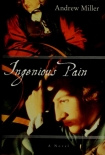Ingenious pain by Andrew Miller (best young adult book series txt) 📗

- Author: Andrew Miller
Book online «Ingenious pain by Andrew Miller (best young adult book series txt) 📗». Author Andrew Miller
The house is in the back streets. The horse must pick its way through trash. Figures swish past them in the darkness.
'Here's home, boy - for now. Come meet your step-mama.'
Home, from the vague shadowing of its form, appears like the outhouse of a farm and may once have been so before the city swallowed it. Inside, however, there is a sense of rudimentary housekeeping. A fire growls in the hearth, there are pictures on the wall, china in the dresser, even two geraniums at the curtained window and, above them, a large, vicious-looking parrot, rocking edgily on its perch.
Grace Boylan stands at the door with a candle, a shawl over her hair. She glances at the boy, then searches over his shoulder for Gummer, reaching out to take his arm and lead him into the warm. She sits him on a chair, knocks up a glass of curdled milk and ale, and as he drinks it she strokes his cheek, coos and settles her bulk upon his knee.
Gummer drains his glass with a sigh, beams and says: 'I said I should fetch him. See how tall he has become. My, they must have been feeding him well.' He pushes the woman off his knees, winces and stands. 'First things first.'
He covers the space with remarkable agility, fetches the boy a clout on the side of his head. While James reels Grace fetches him another, then a third, sweetly weighted, sweetly timed. James goes down. They begin to kick him.
'Not the head!' cries Gummer. 'Not the head!'
They keep at it for five minutes, then flop in seats, wheezing. Boylan looks done up, bad as if they have been kicking her, yet peacefijl, as if it has done her some good, brought her some peace.
James sprawls on the floor. He is not uncomfortable; it is only that he cannot find his breath. The ceiling pulses Hke a skin. The room is growing darker. He sees Gummer take off his shoes and warm his feet above the coals. 'Tomorrow, Gracie, we shall celebrate. Drink the town dry. What do you say to that?'
The parrot, like a decayed angel, swoops from its perch and settles on the back of Gummer's chair. 'Not the head!' it cries. 'Not the head! Not the head!'
When James wakes he is in bed, fiiUy dressed. Opposite the bed is a small window. The day's grey beginnings ooze over the roof of the house across the way. He sits up, strips off his shirt and looks at the welts on his chest. Impressive. He slides from the bed, goes to the window. No parkland, no maze, no purple woods. In the street below, the cobbled gutter, a girl-child, one arm round the neck of a dog, squats and watches the golden rope of her water wind through the crevices between the stones. A man leans out of a window, rubs his face, looks up at the weather.
At the foot of the bed is a parcel. James sits on the bed and lifts it on to his lap. Old clothes, most quite useless now, too small, too ragged. He drops them on to the floor. Underneath is the box, its sides scratched, splintered in places. He opens it. Venus rolls about like a marble. The sun is dented. The moon leans drunkenly away from the Earth.
Patiently, he sets to work, restoring his universe.
In town, to the casual observer, the three of them are like a family. Gummer remarks on it; even Grace seems taken with her part, and when, in the tap-room of the Anchor, Israel England, pimp, points out the likenesses - father's hands, mother's nose - she turns to James and detonates in the region of his cheek a kiss of oysters and porter.
From the Anchor to the Sailor's Return, then to the Black Horse, the Queen Anne, the Star, the White Horse, the Grapes; back to the Black Horse; then roaring and skittish into the Lobster Pot, Gummer cracking his forehead on the lintel, but for the moment as insensitive to pain as the boy, the youth, the young man behind him.
Grace dabs with her handkerchief, orders gin and hot water. They drink as if they have not drunk in days. Only James sees what is happening, sees the hands held like playing cards hiding the men's mouths, hears the faint susurration of their plotting, knows without quite understanding it, the presence of danger. If he speaks now, will he save them? Does he care to? He looks over at Gummer. He was not sorry to see him in the bush, the sly grin, the quick, amused eyes. But Gummer has changed, or he himself has changed. What was it he liked about him? That Gummer recognised him when the others did not, or at least pretended they did not. For that there was a store of goodwill, a meagre store, all used up now. 'Down the hatch, Gracie!' says Gummer. A fellow in white ducks, hands tattooed with blue webs, goes out, looks along his shoulder at the boy as he passes. To meet those eyes is to become a confederate. James meets them; he says nothing.
The others finish their





Comments (0)